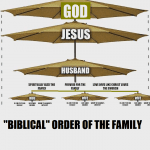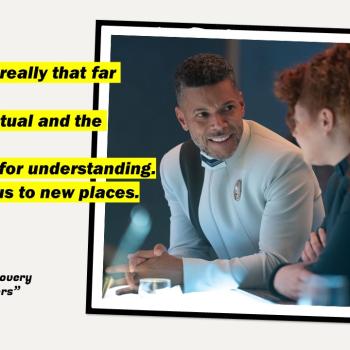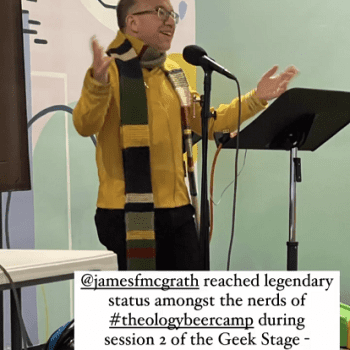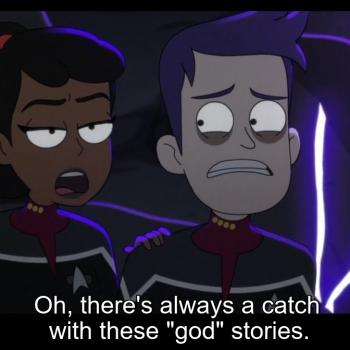A friend of mine noticed that I mentioned in passing that I hold to a panentheistic view of God, and asked for more information. And so I thought I would share some things that I have already written on the topic. It turned out that there were several such relevant posts, most from many years ago, and so I decided to quote what I think are particularly interesting bits here, with links to the original posts for my friend and anyone else reading this to trace the excerpts back to their original context. I’ll start with a post called “Why Panentheism?” since it addresses precisely the question of why I hold the view that I do:
I don’t know that I, from my own human perspective, can sort out where Nature ends, or where God ends, or whether talking about either having an “end” really makes any sense. But by not positing a radical distinction between the two, I can note that most people would agree that there is a Reality that transcends us, which caused us to exist, and “in which we live, and move, and exist.” And so I think that helpfully moves things away from fruitless debates about “Does God exist?” to a discussion of “What is reality, how do we know, and how should we live in light of both what we know and the limitations on our knowledge?”
There is, in addition to this aspect of humility and recognizing the limits of my own and any human perspective on God and the cosmos, a theological aspect that relates to problems at the intersection of the anthropomorphic theism depicted in the Bible and the problem of undeserved suffering. And so, from a blog post that asked whether my view of God can “live long and prosper”:
To say that God once parted seas and flooded worlds and now helps Americans find parking spaces is, in my opinion, a move backwards and not forwards in our theological thinking. Indeed, that there are religious believers who will deal with the problem of evil by saying that God does not intervene to prevent genocides and rapes and starvation on a grand scale in order to allow room for free will, but who will then thank God for intervening to get them a job or help them find a bargain at the mall, is not merely disturbing but truly sickening.
In another post, I talk about God being a mystery rather than an explanation:
In a sense, all that we mean by “universe” really was encompassed within the Hebrew term elohim, the deity. While I would not go so far as to argue that the ancient Hebrew authors were advocates of panentheism, their worldview can be plotted on a trajectory moving in that direction.
That we are dealing with a trajectory and not an end point is important to note. Some Biblical authors still thought of God fighting with the sea monster to create, as was the norm in the wider Mesopotamian context. The furthest that the Israelites got was to think of all the deities – the storm god, the heavens and mother earth all wrapped into one God in the singular who is responsible for all the things these diverse deities were thought to do – fertility of womb and of soil, creation of life, blessing of households, and so on. But there is still much of the assumptions of pre-scientific polytheism in such a view of God, and it still attributes a personal purpose to forces of nature, to weather, to earthquakes, and so on.
Without the Hebrews’ insights into the unity of these divine/natural forces, the rise of modern science might never have been possible. The challenge to the theologian in the modern scientific age is to find ways of embracing science, one of Abraham’s children every much as Judaism, Christianity and Islam, and to find the next spot we can affirm on the trajectory of mystery that begins, but by no means ends, with the writings of the Biblical authors.
And in a post that responded to a challenge asking progressive Christians to write substantively about God, I explored the widely-used analogy between soul and body on the one hand, and God and cosmos on the other:
If we take seriously the depiction of God relating to the world as we do to our bodies, then assuming we consider personhood an emergent property rather than something inserted into us as a separate substance, there is no place where we can pinpoint our “self” if one removes the entirety of our bodies. The human person is a reality that emerges from the organization and interaction of the constituent parts that make us up, and is not to be found somewhere tucked in between the cells. And so, if we think of God as the highest order of emergence out of all that exists, then we can truly say, in good panentheistic fashion, that God is everywhere, and all things exist in God, and yet none of them simply is God. And when we think about the connections that come to exist between us, and emerge as something transcendent from the interaction, then we may say things such as “God is love” and really mean it.
In the past, I have used the analogy of two cells in a human body talking about their existence. One, an “atheist” or perhaps “ahumanist” says that it looks around and sees nothing but cells – they are born, they die, and that is it. The second says that sometimes it thinks that they are all part of something greater, like one big Cell. The latter is projecting its own image onto a transcendent reality that it cannot fathom. But it is intuiting something about the nature of existence that the first denies, and so is not entirely wrong, and is perhaps correct in important respects even though a cell can never have concepts or language to talk about what a human person is like.
And so this language points to a sense of being part of a Reality that connects and hangs together in ways that I cannot fathom from within the midst of it, but nonetheless intuit and affirm and believe…
This approach is a model that I find useful. But to take these as literal statements about God would be to mistake the way religious language functions. It is a pointer towards transcendent realities that we cannot speak of directly. But what these metaphors offer are ways of relating to and pointing to that transcendent reality we refer to as God, in ways that make sense in light of our current understanding of the cosmos and of ourselves. The symbols I am recommending will have a limited duration of usefulness. All human symbols do. But we cannot simply use older symbols when our understanding of the world has radically changed. We have no choice but to find new ways of thinking and speaking – being prepared to jettison them when the time comes.
That should get the conversation started, but there is more that you can find on my blog (to say nothing of elsewhere) that relates to this topic, whether directly or indirectly. In particular see the recent discussion of panentheism in Reform Judaism. And here on my blog, see for instance my post asking whether panentheism is atheism, another exploring differences between panentheism and pantheism, and “Religion 2.0.“













